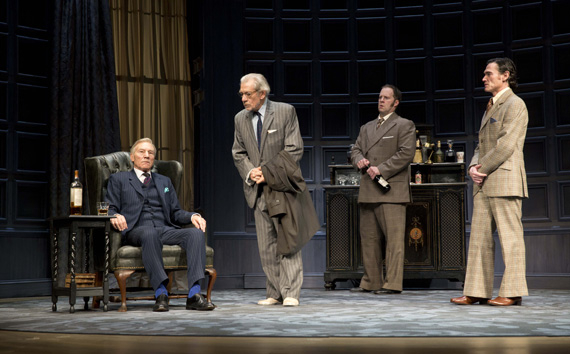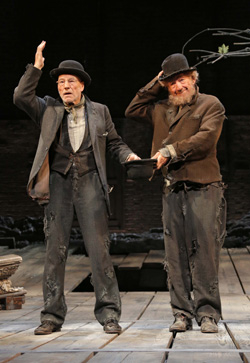No Man's Land and Waiting for Godot

(© Joan Marcus)
Nature is reclaiming the stage of the Cort Theatre. Creeping vines grow up the side of the proscenium and precariously close to the lighting and sound equipment. Conspicuously large cracks appear in the scenery. The scrim is frayed at the end, ready to unravel at any moment. This unifying decrepitude binds together the two excellent plays running in repertory: Harold Pinter’s No Man's Land and Samuel Beckett’s Waiting for Godot. An all-star cast of Ian McKellen (Amadeus), Patrick Stewart (Macbeth), Billy Crudup (Arcadia), and Shuler Hensley (The Whale) illuminates these two often difficult and opaque texts, bringing their stories of idle humanity in the face of impermanent existence into full focus. This is a quartet of the foremost actors of our time performing classic and challenging theater (you know, the kind they make you read in college) in fresh and infinitely accessible productions. It’s a once-in-a-lifetime theatrical event not to be missed.
Set entirely in a large drawing room of spare luxury, No Man’s Land is the story of Hirst (Stewart), a wealthy man of letters, now past his prime. Rather than writing, he seems content to sit in his big chair and drink scotch while slowly losing his wits. His “caretakers,” Foster (Crudup) and Briggs (Hensley), bring him everything he needs, keeping him distracted from inconsequential things like meetings with his financial advisor. When one day Hirst invites Spooner (McKellen) in for a drink, the latter man threatens to upend this secluded retirement with his wild talk of poetry readings and young people. But why should Hirst even bother with those whelps when he could comfortably sit up in his castle and get blitzed?
The set and costumes are superbly designed by Stephen Brimson Lewis. Spooner’s rumpled grey suit, white socks, and tennis shoes betray his humiliating poverty, even as McKellen steadfastly maintains a quiet dignity. This contrasts sharply with Hirst’s elegant three-piece suit and the mobster-chic worn by Foster and Briggs. Director Sean Mathias (taking another crack at the Cort since his last excursion there, Breakfast at Tiffany’s) has drawn out the subtext of both plays, using design to accentuate the brilliantly nuanced performances of his actors.
Crudup and Hensley usher in a silently menacing air every time they walk on stage in No Man’s Land. Crudup is like a cat, skittish and unpredictable, ready to pounce at the slightest provocation. In contrast, Henley is the big dog, quietly slumbering in the corner, but certainly the more threatening of the two. Stewart offers an understated and realistic portrayal of a powerful man slipping into oblivion. His hand has the slightest hint of palsy (perhaps the earliest signs of Parkinson’s disease). He attempts to throw a tumbler across the room in a fit of rage, like the Brando-esque alpha-male in another play, one in which he’d rather appear. It lands pitifully on the floor a few feet away. All around him the wood paneling is cracking and decaying, ready to give way to nature’s inexorable will.

(© Joan Marcus)
Waiting for Godot sees the stage stripped bare, suggesting the Cort in a post-apocalyptic wasteland. A large tree sprouts up from the floorboards. Side boxes crumble while ancient curtains hang in tatters from the fly system. The upstage brick wall is exposed with another wall crumbling immediately downstage, from whence Estragon (McKellen) emerges as if he’d just been through the London Blitz. (Waiting for Godot originally premiered in 1953, when the devastation of war would have still been fresh on everyone’s minds.)
Famously described by Irish literary critic Vivian Mercier as “a play in which nothing happens, twice,” Waiting for Godot features a tremendous amount of stage business between two slovenly dressed bums, Estragon and Vladimir (Stewart). Estragon takes off his boots; he puts them back on; the two banter about trivialities; they’re visited by Pozzo (Hensley, like the jerkwad southern-fried uncle of Bozo the clown) and his slave Lucky (a drooling blonde-locked Crudup). Intermittently, Estragon suggests they leave or hang themselves at which point Vladimir reminds him that they cannot because they’re waiting for Godot (pronounced GOD-oh). They cannot leave lest they incur his wrath. Then we all go to the bathroom and come back and do it again in the second act.
“This is becoming really insignificant,” says Vladimir, eliciting uproarious laughter from the audience. (In the hands of master comedians like Stewart and McKellen, Beckett has likely never been this funny.) McKellen is hilarious and earthy, an English country bumpkin. Stewart has the more difficult character arc, however, and he succeeds wildly, illuminating the painful existential revelations inherent to this play with ferocity.
He’s Captain Picard in the Nexus, but without sage Whoopi Goldberg to guide him. Instead of a cozy, soft-lit English Christmas cottage full of immaculately dressed children, he’s got a cruddy bombed-out theater full of hobos. But it could always be worse. And couldn’t it get better? That’s why they’re waiting for the salvation of an imaginary and powerful friend who probably doesn’t exist and likely won’t ever come. Stewart makes this painful journey with the audience, holding our hands and pushing us when necessary. His every realization is our own. Chief among them: The only sure thing in life is death, so it’s up to you to find a reason to get up in the morning.
Ultimately, all things come to an end: our strength, our agency, our lives, and these plays (limited run through March 2). Go see them while you still can.












